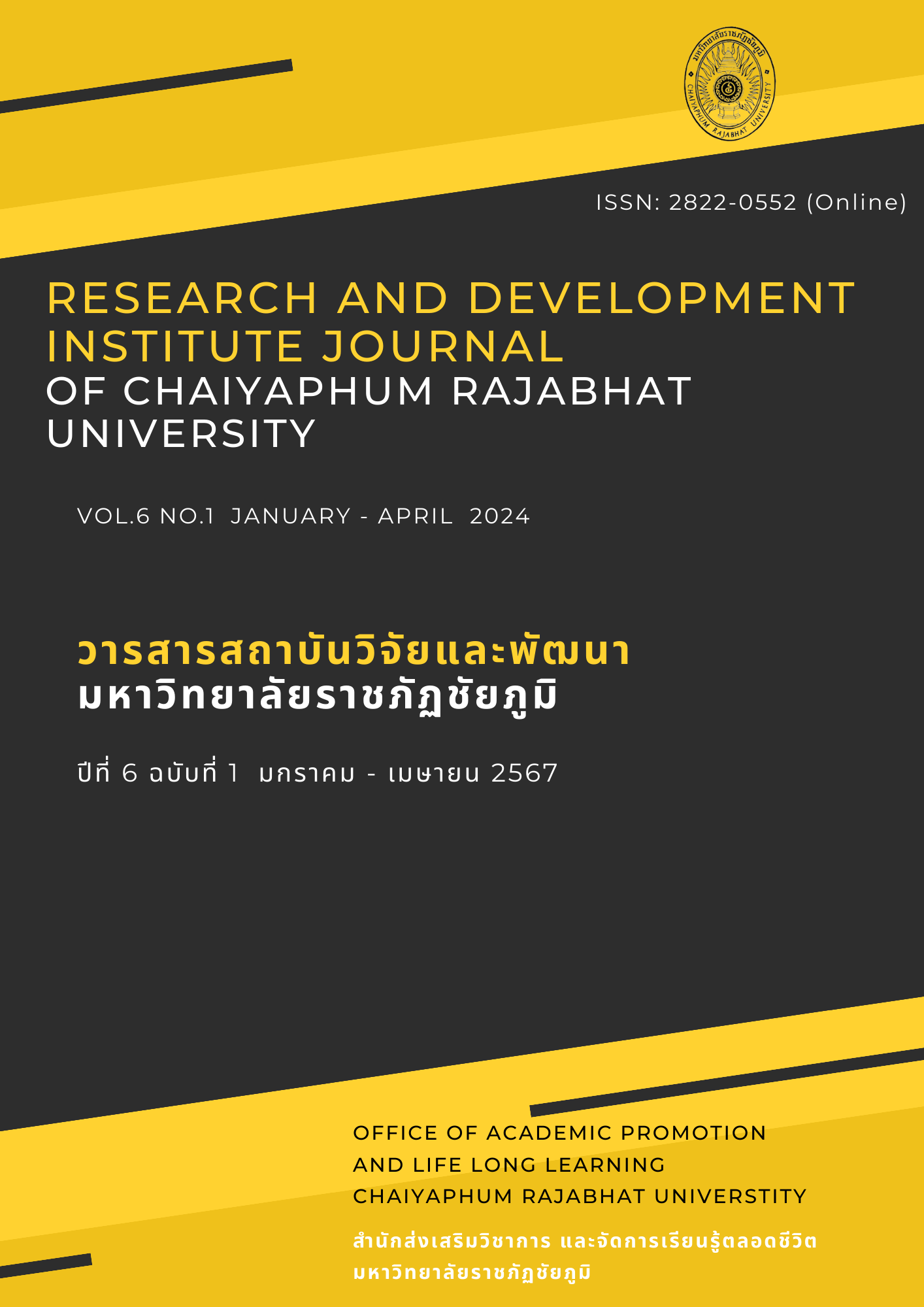THE CAUSAL MODEL OF ADMINISTRATIVE FACTORS INFLUENCING EDUCATIONAL EFFECTIVENESS OF OPPORTUNITY EXPANSION SCHOOLS UNDER THE OFFICE OF BASIC EDUCATION COMMISSION
Main Article Content
Abstract
This research aimed to: 1) study the level of educational institution administration in educational opportunity expansion schools; 2) study the factors of educational institution administration influencing the effectiveness of educational opportunity expansion schools; and 3) validate the consistency of the theoretical model with the empirical data that influenced the effectiveness of educational opportunity expansion schools. This research applied mixed methods and was divided into 3 phases. Phase 1 was the documentary study and interview of 3 experts selected by purposive selection according to set criteria. The research instrument was a semi-structured interview form. The data were analyzed by content analysis. Phase 2 was the analysis of the causal model of school administration factors that influenced the effectiveness of educational opportunity expansion schools. The research sample was educational institution administrators and teachers acting as department heads of educational opportunity expansion schools under the Office of the Basic Education Commission, totaling 500 respondents, derived by multi-stage sampling. The research instrument was a questionnaire constructed by the researcher. Statistics used for data analysis were frequency, percentage, mean, standard deviation, and path analysis. Phase 3 was the consistency validation of the theoretical model with the empirical data that influenced the effectiveness of educational opportunity expansion schools. The data were collected through 5 experts selected by purposive selection according to the set criteria. The instrument for consistency validation was a causal model validation and confirmation form. Statistics used for data analysis were frequency, percentage, and content analysis.
The research results were as follows:
1. Overall and in specific aspects, the level of educational institution administration in educational opportunity expansion schools was at the highest level. The aspects included efficient budget and resource management, participative management, personnel administration, leadership, curriculum administration, organizational climate, educational innovation, and the use of educational information technology, respectively.
2. The factors of educational institution administration influencing the effectiveness of educational opportunity expansion schools, ranking from the highest to the lowest influence, were educational innovation, efficient budget and resource management, curriculum administration, personnel administration, organizational climate, and use of educational information technology. The model was fit to the empirical data with CMIN/df = 1.341, p-value = 0.210, GFI = 0.995, AGFI = 0.973, CFI = 1.000, NFI = 0.998, IFI = 1.000, RFI = 0.992, RMR = 0.001, and RMSEA = 0.024.
When considering the total influence in descending order, the aspects included efficient budget and resource management, personnel administration, use of educational information technology, leadership, curriculum administration, participative management, and educational innovation, respectively.
3. The validation of the causal model of educational institution administration factors influencing the effectiveness of educational opportunity expansion schools by the experts showed that the developed model was accurate, appropriate, feasible, and usable.
Article Details

This work is licensed under a Creative Commons Attribution-NonCommercial-NoDerivatives 4.0 International License.
Permission to use text, content, images, etc. of publication. Any user to read, download, copy, distribute, print, search, or link to the full texts of articles, crawl them for indexing, pass them as data to software, or use them for any other lawful purpose. But do not use it for commercial use or with the intent to benefit any business. Published under a Creative Commons Attribution-NonCommercial-NoDerivatives 4.0 International License.

This work is licensed under a Creative Commons Attribution-NonCommercial-NoDerivatives 4.0 International License
References
จรุณี เก้าเอียน. (2557). เทคนิคการบริหารงานวิชาการในสถานศึกษา กลยุทธ์และแนวทางการปฏิบัติสำหรับผู้บริหารมืออาชีพ (พิมพ์ครั้งที่ 2). สงขลา: ชานเมืองการพิมพ์.
จิตรจรูญ ทรงวิทยา. (2561). ทักษะการบริหารของผู้บริหารสถานศึกษา, Journal of Roi Kaensarn Academi. 3 (1), 41-57.
ฉวีวรรณ แผ่วตะคุ. (2562). ปัจจัยที่มีอิทธิพลต่อความเป็นเลิศของการบริหารโรงเรียนประถมศึกษาขนาดเล็ก สังกัดสํานักงานเขตพื้นที่การศึกษาประถมศึกษาภาคตะวันออก. [วิทยานิพนธ์ปริญญาดุษฎีบัณฑิต]. มหาวิทยาลัยบูรพา.
ชุมสาย บวรศักดิ์เสถียร. (2556). รูปแบบการพัฒนาสมรรถนะบุคลากรทางการศึกษาขององค์กรปกครองส่วนท้องถิ่น. วารสารวิชาการมหาวิทยาลัยอีสเทิร์นเอเชีย. 3(2), 49-56.
ณัฐมนต์ ชาญเชิงค้า. (2561). รูปแบบการบริหารสถานศึกษสู่ความเป็นเลิศของโรงเรียนขยายโอกาส สังกัดสำนักงานคณะกรรมการศึกษาขั้นพื้นฐาน. วารสารมนุษยศาสตร์และสังคมศาสตร์ (สทมส.). 24 (3), 87–101.
ทนงศักดิ์ นาคแก้ว. (2563). ปัจจัยที่ส่งผลต่อประสิทธิผลการบริหารหลักสูตรสถานศึกษาของโรงเรียน สังกัดสำนักงานเขตพื้นที่การศึกษามัธยมศึกษา เขต 32. วารสารวิชาการศิลปะศาสตร์และวิทยาศาสตร์. 7(2), 97-110.
ทรัพย์หิรัญ จันทรักษ์. (2551). รูปแบบความสัมพันธ์เชิงสาเหตุปัจจัยบทบาทการบริหารเทคโนโลยีสารสนเทศและการสื่อสารของผู้บริหารสถานศึกษาขั้นพื้นฐานที่ส่งผลต่อประสิทธิผลของโรงเรียน. [วิทยานิพนธ์ปริญญาดุษฎีบัณฑิต]. มหาวิทยาลัยราชภัฏสกลนคร.
ธีรศักดิ์ อุปรมัย อุปไมยอธิชัย. (2563). การบริหารและการจัดการศึกษาสู่การพัฒนาที่ยั่งยืน. พิษณุโลก: สำนักพิมพ์มหาวิทยาลัยนเรศร.
ธวัชชัย ตั้งอุทัยเรือง. (2557). โมเดลความสัมพันธ์เชิงสาเหตุของประสิทธิผลโรงเรียนประถมศึกษาขนาดเล็กสังกัดสำนักงานคณะกรรมการการศึกษาขั้นพื้นฐานในภาคกลางของประเทศไทย. [วิทยานิพนธ์ปริญญาดุษฎีบัณฑิต]. มหาวิทยาลัยคริสเตียน.
บุญชม ศรีสะอาด. (2556). การวิจัยเบื้องต้น (พิมพ์ครั้งที่ 9). กรุงเทพฯ: สุวีริยาสาส์น.
นิฟิรดาวส์ นิ. (2563). ทบทวนมุมมองการจัดการศึกษาอาชีวศึกษาในยุคสังคมพลิกผัน. วารสารมหาวิทยาลัยราชภัฎบุรีรัมย์, 12(1), 111-125.
บุพกานต์ ศรีโมรา. (2562). ความหลากหลายของนวัตกรรมการบริหารเพื่อการเปลี่ยนแปลงในโรงเรียนมัธยมศึกษา. [วิทยานิพนธ์ปริญญาดุษฎีบัณฑิต]. มหาวิทยาลัยศิลปากร.
ยุทธชาต นาห่อม. (2564). การบริหารสถานศึกษา บนฐานความปกติใหม่. ใน การประชุมวิชาการนำเสนอผลงานวิจัยระดับชาติและนานาชาติ ครั้งที่ 14 (18 สิงหาคม หน้า 1208-1217). กรุงเทพมหานคร: มหาวิทยาลัยราชภัฏสวนสุนันทา.
รังสรรค์ อ้วนวิจิตร. (2554). รูปแบบความสัมพันธ์เชิงสาเหตุประสิทธิผลของโรงเรียนประถมศึกษาขนาดเล็ก. [วิทยานิพนธ์ปริญญาดุษฎีบัณฑิต]. มหาวิทยาลัยคริสเตียน.
เรณู บุญเสรฐ (2561). รูปแบบการบริหารหลักสูตรสู่ประสิทธิผลการจัดการเรียนรู้ของโรงเรียนมัธยมศึกษาขนาดเล็ก. [วิทยานิพนธ์ปริญญาดุษฎีบัณฑิต]. มหาวิทยาลัยนเรศวร.
ฤทัยรัตน์ ปัญญาสิม. (2560). การบริหารงานแบบมีส่วนร่วมที่ส่งผลต่อประสิทธิผลการบริหารสถานศึกษา. วารสารศิลปากรศึกษาศาสตร์วิจัย. 9(1), 299-313.
วรรณิศา โมราบุญ. (2559). ปัจจัยส่งผลต่อประสิทธิผลในการบริหารสถานศึกษาขนาดเล็กสังกัดสำนักงานเขตพื้นที่การศึกษาประถมศึกษานครศรีธรรมราช เขต 4. วารสารวิชาการศึกษาศาสตร์ มหาวิทยาลัยศรีนครินทรวิโรฒ, 10(1), 146-156.
สมหมาย เทียนสมใจ. (2559). รูปแบบการบริหารานที่มีประสิทธิผลของสำนักงานเขตพื้นที่การศึกษาประถมศึกษา. [วิทยานิพนธ์ปริญญาดุษฎีบัณฑิต]. มหาวิทยาลัยศิลปากร.
สัมฤทธิ์ ต้นสวรรค์. (2559). รูปแบบการพัฒนาภาวะผู้นำเชิงกลยุทธ์ของผู้บริหารโรงเรียนประถมศึกษาขนาดเล็ก สังกัดสำนักงานคณะกรรมการการศึกษาขั้นพื้นฐานเขตตรวจราชการที่ 11. [วิทยานิพนธ์ปริญญาดุษฎีบัณฑิต]. มหาวิทยาลัยราชภัฏสกลนคร.
สำนักวิชาการและมาตรฐานการศึกษา สำนักงานคณะกรรมการศึกษาขั้นพื้นฐานกระทรวงศึกษาธิการ. (2553). แนวทางการบริหารจัดการหลักสูตร ตามหลักสูตรแกนกลางการศึกษาขั้นพื้นฐาน พุทธศักราช 2551 (พิมพ์ครั้งที่ 2). กรุงเทพมหานคร: โรงพิมพ์ชุมนุมสหกรณ์การเกษตรแห่งประเทศไทย จำกัด.
สำนักงานคณะกรรมการการศึกษาขั้นพื้นฐาน. (2555). นโยบายและแนวปฏิบัติเกี่ยวกับการรับนักเรียนสังกัดสำนักงาน คณะกรรมการการศึกษาขั้นพื้นฐาน. กรุงเทพฯ: สำนักงานคณะกรรมการการศึกษาขั้นพื้นฐาน.
สำนักงานคณะกรรมการการศึกษาขั้นพื้นฐาน. (2565). ประกาศสำนักงานคณะกรรมการการศึกษาขั้นพื้นฐาน เรื่อง นโยบายและจุดเน้นของสักงานคณะกรรมการการศึกษาขั้นพื้นฐาน ประจำปีงบประมาณ พ.ศ. 2566. https://www.obec.go.th/about/นโยบายสพฐ-ปีงบประมาณ 2566
สำนักเลขาธิการสภาการศึกษา. (2564). นวัตกรรมการบริหารจัดการสถานศึกษาในประเทศไทยและประเทศที่คัดสรร เพื่อพัฒนาผู้เรียนสู่ศตวรรษที่ 21. นนทบุรี: สำนักงานเลขาธิการสภาการศึกษา.
สำนักงานศึกษาธิการจังหวัดชัยภูมิ. (2560). แผนปฏิบัติราชการประจำปี. ชัยภูมิ: สำนักงานศึกษาธิการจังหวัดชัยภูมิ.
สุนันท์ รุ่งอรุณแสงทอง. (2561). การบริหารสถานศึกษาขั้นพื้นฐานให้เกิดประสิทธิภาพ. [วิทยานิพนธ์ปริญญาดุษฎีบัณฑิต]. มหาวิทยาลัยศิลปากร.
สุวิมล ติรกานันท์. (2553). การวิเคราะห์ตัวแปรพหุในงานวิจัยทางสังคมศาสตร์. กรุงเทพฯ: โรงพิมพ์แห่งจุฬาลงกรณ์มหาวิทยาลัย.
อนุชา เงินแพทย์. (2560). รูปแบบความสัมพันธ์เชิงสาเหตุของภาวะผู้นำทางวิชาการของผู้บริหารและบรรยากาศโรงเรียนที่ส่งผลต่อประสิทธิผลโรงเรียนมาตรฐานสากล. วารสารวิจัยและพัฒนา มหาวิทยาลัยราชภัฏสวนสุนันทา, 9(1), 91-109.
อุมาพร กาญจนคลอด. (2558). ความสัมพันธ์เชิงสาเหตุและผลลัพธ์ของประสิทธิผลในการจัดการนวัตกรรมหลักฐานเชิงประจักษ์ของเทศบาลในประเทศไทย. [วิทยานิพนธ์ปริญญาดุษฎีบัณฑิต]. มหาวิทยาลัยศิลปากร.
Amadi-Eric, C. (2016). Introduction to educational administration a module. Nigeria: Harey Publications.
Birkinshaw, J., Hamel, H. & Mol, M. J. (2008). Management innovation. Academy of Management Review, 33(4), 825-845. https://www.researchgate.net/publication/258242985_Management_innovation_Acad_Manage_Rev
Gibson, J. L., Ivancevich, M. & Donnelly, J. Jr. (1982). Organizations: Behavior, structure process (4th ed.). Texas: Business Publication.
Halpin, A. W. & Crofts, D. B. (1966). The original climate of schools. Chicago: University of Chicago.
Igunnu, A. (2020). Study of quality assurance in examination conduction and administrative effectiveness of principals in public and private secondary schools in Niger State. Nigeria International Journal of Research in Social Science and Humanities (IJRSS). 1(3), 1-8.
Zamir, N. A. (2020, March). A review of school effectiveness theory for school improvement. International Journal of Academic Research in Business and Social Sciences, 10(3), 113–123.


